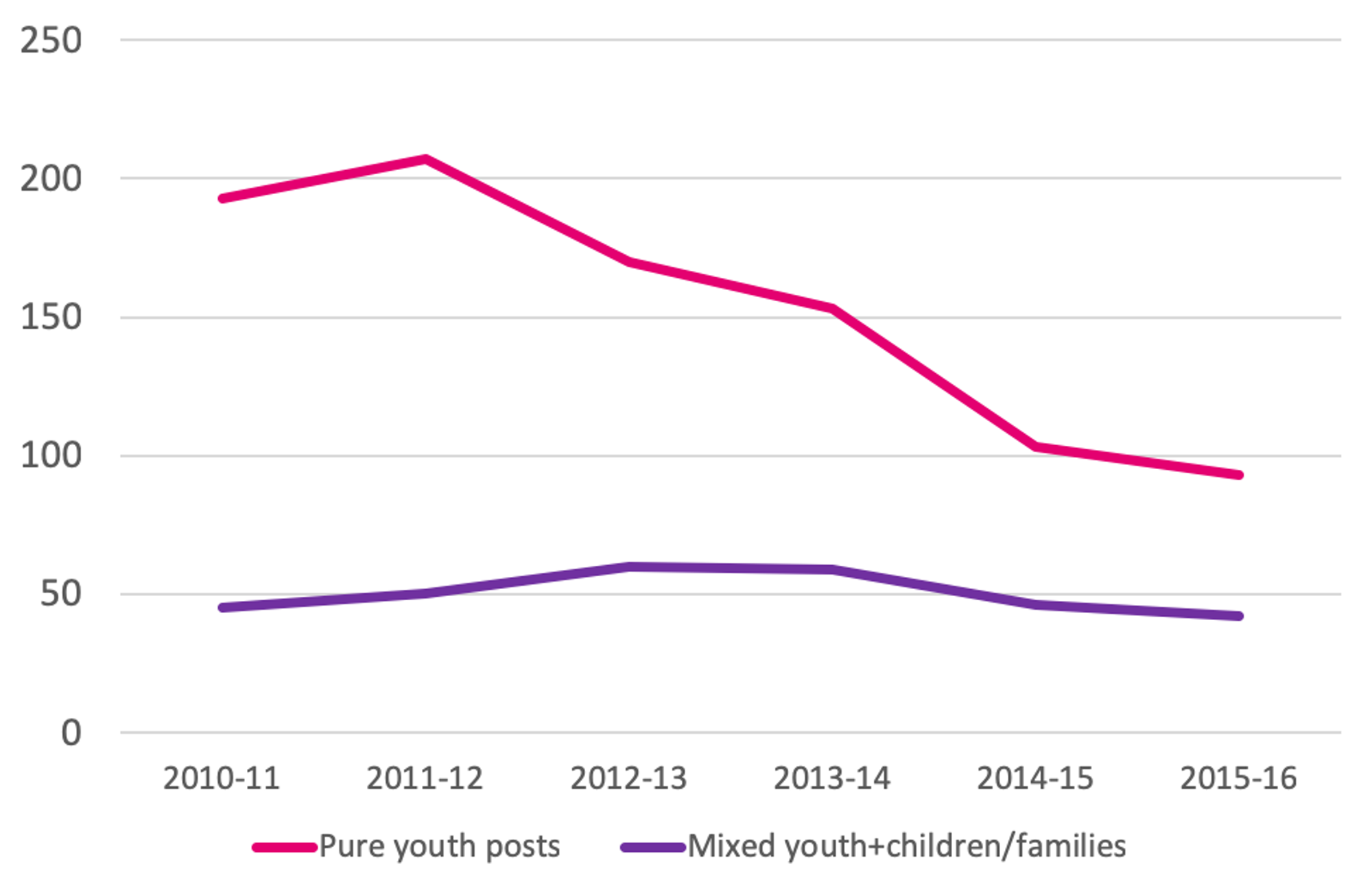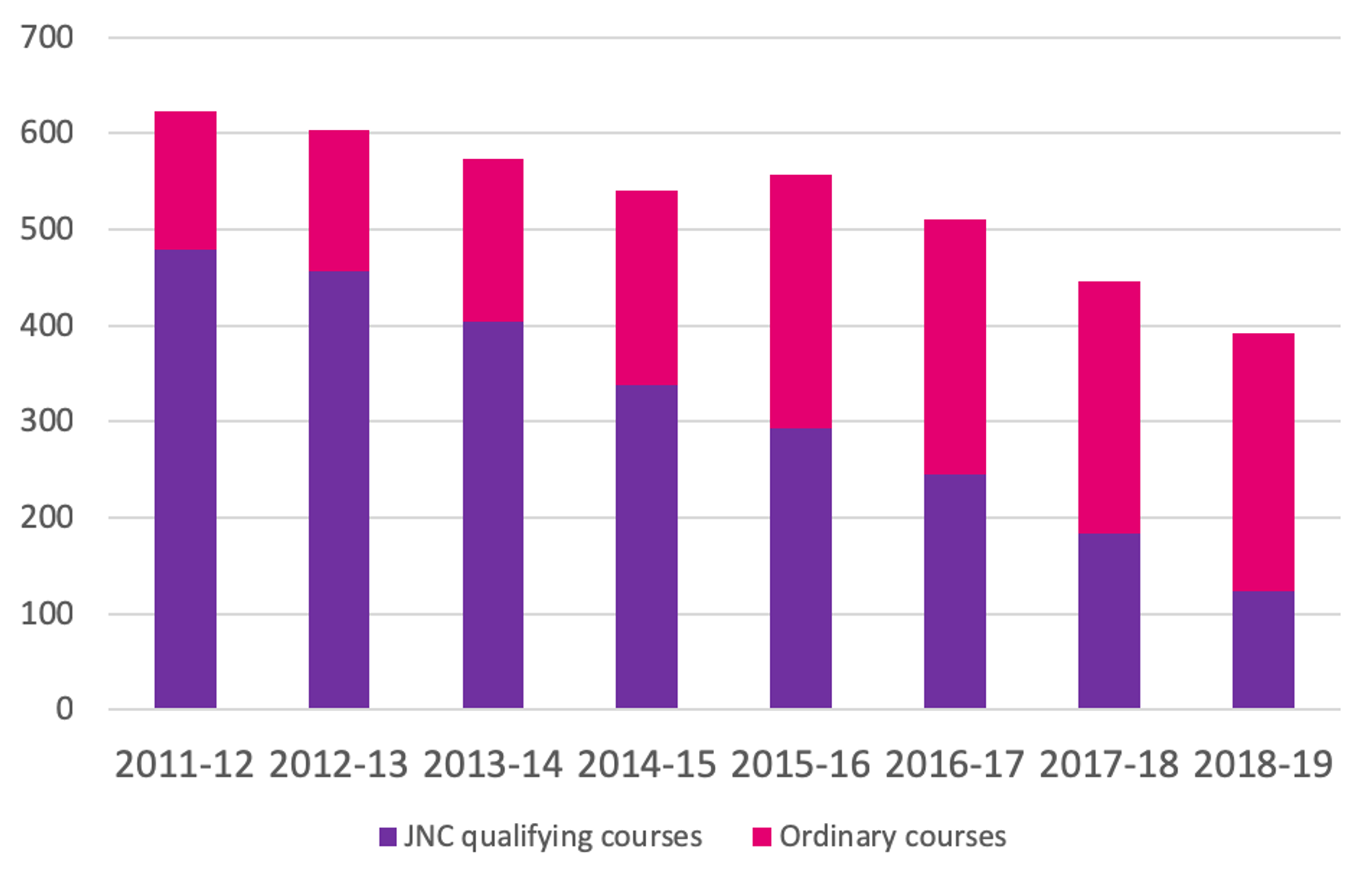The number of students training for Christian youth and/or children’s work is in decline. Why is that, and what does it mean for the future?
This guest article was written by David Howell, who has been involved with Christian youth work for fifty years, establishing qualifying courses with CYM and now working as a consultant and trainer. David runs the UK Christian Youth Work Consortium and you can find out more about available training opportunities at his website Christian Youth Work Training.
At a time when England generally is waking up to the need for good youth work [i], when churches have identified the need for more helpers and leaders,[ii] and when research has shown that an Anglican church with a children’s/youth worker will have more children and young people [iii], fewer students are choosing to train in this vital area!
An analysis of trends in the numbers of students studying for higher education qualifications in Christian youth work/ministry and/or children’s work/ministry in the UK across the last eight years has revealed some concerning trends. [iv]
Key figures
- In the 2011-12 academic year there were 623 on higher education programmes; 575 undergraduate and 48 postgraduate students. During the 2018-19 academic year there have been 391.5 [v] students; 361 undergraduate and 30.5 postgraduate. The drop in numbers has been 37.2%, just over a third.
- Numbers of new students recruited to commence at the beginning of the academic year have been counted from 2013 forward.There was a general increase across the first three years, from 160 in 2013-14 to 180.5 in 2015-16; those gains were lost across the next three years with the total September 2018 cohort standing at 141. Recruitment has dropped by 12% across the six years.
- In September 2011 there were 16 colleges/training agencies offering a total of 33 Christian youth work/ministry programmes. A further five colleges/training agencies offered eight courses which included an element of Christian youth work/ministry, such as a placement with a Christian faith-based organisation. Six of the colleges/training agencies offered a total of 10 (JNC) professionally recognised courses [vi].
- In September 2018 there were 14 colleges/training agencies offering 23 Christian youth work/ministry programmes. A further four colleges/training agencies offered eight courses which included an element of Christian youth work/ministry or Children’s work/ministry, often within the placement. Three of the colleges/training agencies offered a total of four (JNC) professionally validated programmes.
- In September 2011 there were 479 students on professionally qualifying programmes and 144 on non-professional qualifying courses. In 2018-19 the situation has reversed with 123.5 on professional qualifying routes and 268 on non-professionally qualifying programmes.
Chart: Number of adverts in Youthwork and Premier Youth and Children's Work

Why the decline?
The reasons for the decline and changes in numbers are complex. Within England, the reduction of local authority youth services caused by austerity, has resulted in fewer students entering youth work qualifications generally [vii]. This decline in the perceived value of youth work has been reflected in the churches, with fewer people being employed as youth workers. Over time this leads to a ‘chicken and the egg’ scenario with fewer youth workers in churches role-modelling a career which young people would then aspire to, and thus fewer entering the work.
The rise in student fees has likely put many off training, especially mature students for whom an additional debt on top of family and home commitments is just not feasible. However, many of the institutions which deliver the programmes, such as Moorlands, Nazarene and others, have registered with the Office for Students enabling students to access full tuition fee loans and maintenance loans/grants through the Student Loan Company.[viii]
At the same time there have been some significant changes within our society concerning the way that families work and how they use Sundays, that impact church-based youth work. School and club sports now have to use the weekends for training and events; both parents working means that people are generally busier; blended families mean that children are often visiting the other parent on Sundays and people are generally saying that they are exhausted and want a lie-in! [ix] This is part of why fewer children and young people attend church, creating a smaller pool of potential recruits to the programmes.[x]
Chart: Numbers on degree courses by JNC/non-JNC route

What next?
Colleges and training agencies have responded in a variety of ways to the decline, one of which has been to put training nearer to the placements where the students are based, thus enabling a full-time programme to be managed whilst working for and learning the trade through a church, a group of churches or a Christian agency.
If the Church is to reach the 95% of children and young people who currently do not attend services, we need to invest in children’s and youth workers who are trained and equipped to think critically, who can adapt to changing societal norms and changing patterns of behaviour within families and who have a heart for this generation and a solid theological and biblical base from which to work.
Further research needs to be undertaken as to why the decline in students is taking place and what can be done to stem the departure of children and young people from the churches and from a living faith in Christ.
For a copy of the report please email davidhowell@cywt.org.uk
References
[i] NYA and the All-Party Parliamentary Group for Youth Affairs’ inquiry into Youth Work. https://nya.org.uk/appg-inquiry/
[ii] Youthscape Centre for Research, OneHope Losing Heart December 2016 p35.
[iii] Dr. Leslie Francis, Dr. Ursula McKenna, Phoebe Hill and David Howell Assessing the impact of a paid children, youth or family worker on Anglican congregations in England Journal of Research on Christian Education Volume 28, 2019 Issue 1 pages 43-50. https://www.tandfonline.com/eprint/chqyKb8ninXfcPBdgsIC/full?target=10.1080/10656219.2019.1593267
[iv] The full report can be found on the Churches Together in England website by following Home > About > Co-ordinating Groups > Christian Youth Work Consortium. https://www.cte.org.uk/Groups/236227/Home/About/Co_ordinating_Groups/Christian_Youth_Work/Christian_Youth_Work.aspx
[v] The figures include full-time and part-time students, the latter being presumed to be 0.5 full-time equivalent.
[vi] JNC = Joint Negotiating Committee for Youth & Community Work which agrees standards and qualifications for general professionally qualifying programmes in youth work in England.
[vii] Youth work training figures reveal record lows on the Children & Young People website.
[vii] The Office for Students is the English body which now recognises colleges and universities and provides the system through which they can allow students to access student loans and maintenance loans/grants.
[ix] Information from a focus group at Christ Church, Swindon, 2017.
[x] See Youth Work Training p24, PREMIER YOUTH & CHILDREN’S WORK February 2018 (Issue 14) for a fuller discussion of these issues.




